Tue 11 Aug 2009
A Review by Mike Nevins: RICHARD ROSEN – Fadeaway.
Posted by Steve under Authors , Bibliographies, Lists & Checklists , Reviews[2] Comments
RICHARD ROSEN – Fadeaway. Harper & Row, 1986. Paperback reprint: Onyx, July 1989.
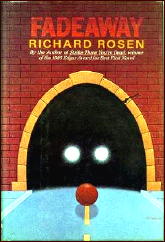
Robert B. Parker may not be the best private eye writer of the eighties but surely he’s the most influential, as witness the horde of newcomers to the field who have used his pretentious, wildly overrated, consistently best-selling series about the Boston PI Spenser as their takeoff point.
Richard Rosen, winner of the Mystery Writers of America Edgar award for the best first crime novel of 1985, deserves another prize for. using Parker most creatively.
The main character both in Fadeaway and in Rosen’s prizewinning Strike Three You’re Dead is a sort of Jewish Spenser, at least in the sense that each man is a smart-mouthed jock from Boston with a liberated live-in lady and a snootful of angst.
Harvey Blissberg has turned hesitantly to the PI game after the early end of his career as a major-league outfielder, but he’s not very good at his new line of work and all his cases seem to come to him from his sports world connections. In Fadeaway he’s hired simultaneously by the Boston Celtics and the Washington Bullets to find out why a basketball star from each team vanished from Logan Airport within forty-eight hours of one another.
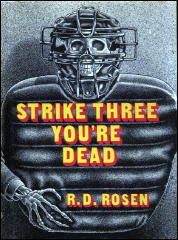
When both players are found shot to death, Harvey follows the trail into the seamy world of college sports recruiting, and his hunch that the murders are tied in with the seven-year-old “accidental” death of a high school basketball champ in a dark bus tunnel stirs up the usual hornet’s nest of corruption.
If Ross Macdonald had written this book, the plot would have been so convoluted you’d need a chart to sort out who did what to whom. Rosen goes to the opposite extreme, leaving out complexity and surprise almost entirely.
If Parker had written the book, there would have been a violent confrontation in every chapter. Rosen avoids action scenes almost entirely, too. But he’s an excellent stylist, with the ability to describe an American city (in this case Providence, Rhode Island) and the inner world of desperately lonely people as well as any PI novelist now at work.
What sets Rosen apart from everyone else in the field, however, is his gift for shifting without effort from the film noir gear into another mode entirely. Here for example is Harvey anguishing over the case with his girlfriend, Mickey:
“You never had an element.”
“Thanks. You’re joking and I’m having a crisis.”
“Life is a series of crises.”
“It hasn’t always felt like this.”
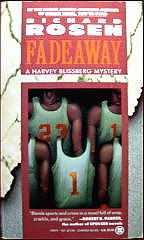
“Okay, I take it back. Life is a series of crises separated by brief periods of self-delusion.”
“I need a pith helmet to protect me from your sayings.”
Jock though he’s supposed to be, Harvey is the only PI in the literature who cries out to be played by Woody Allen.
Fadeaway is crammed with scenes which are not only hilarious in their own right, but marvelous as parodies of the tiresome philosophic shticks in the Spenser novels. It’s light on action and complexity, but the first-rate dialogue and characterizations and the rich anti-Parker subtext make this one a joy to read.
Bibliography — Expanded from the Revised Crime Fiction IV, by Allen J. Hubin:
ROSEN, R(ichard) D(ean), 1949- . SC: Harvey Blissberg, in all titles.
Strike Three You’re Dead. Walker, hc, 1984. Signet, pb, 1986. Walker, trade pb, 2001.
Fadeaway. Harper & Row, hc, 1986; Onyx, pb, 1989.
Saturday Night Dead. Viking, hc, 1988; Onyx, pb, 1989.
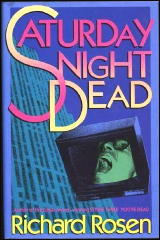
World of Hurt. Walker, hc, 1994.
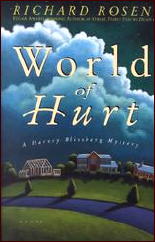
Dead Ball. Walker, hc, 2001.
August 11th, 2009 at 9:13 pm
I tend to judge sports mysteries by whether they entertained me whether I was a fan of the sport involved or not. I’m no basketball fan, but enjoyed this one, especially what I thought was a pointed but affectionate and funny send up of Parker and Spenser. That aspect might not mean as much today, but at the time it was a welcome relief from all the writers trying to copy Parker’s achievements and sales (though some weren’t bad).
I haven’t read any of the others in the series, though perhaps I should catch up.
August 11th, 2009 at 10:06 pm
Given that the most recent two don’t seem to have come out in paperback, I missed them altogether. (My habit over the years was almost always to wait for the paperback, and then never remembering to pick up the hardcover when a softcover edition failed to come out.)
Overall, though, Rosen’s career seems to have faded out badly. His first three books, including this one, were terrific. It’s too bad. He could have been a contender.